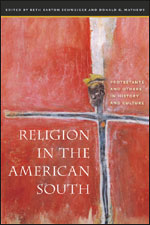FAYETTEVILLE, Ark. — The words “Bible Belt” may not immediately bring to mind images of Muslim slaves, North Carolina Jews or southeastern Indians, but these should be part of any conversation about religion in the American South, according to Beth Barton Schweiger, a history professor at the University of Arkansas.
Schweiger and her colleague, Donald G. Mathews of the University of North Carolina at Chapel Hill, have edited a book on religion in the American South from the beginning of the 18th century to the Civil Rights movement of the 1960s. “Religion in the American South: Protestants and Others in History and Culture,” published by UNC Press, incorporates essays from young scholars on different perspectives on religious experiences.
“These authors think beyond the categories laid out by earlier studies to complicate 'Southern religion’ geographically, chronologically, and thematically,” Schweiger said. “They banish the equation of 'Southern’ with white and challenge the interpretive hegemony of the 'Bible Belt.’”
The essays address a variety of subjects often not considered in discussions of the Bible Belt, including Muslim slaves, biracial revivals, southeastern Indians, Confederate soldiers, North Carolina Jews, white Pentecostals and black Memphis émigrés to Detroit.
This collection pushes the scholarly conversation on Southern religion into new territory in three ways. First, it demonstrates the importance of religion in the South not only to American religious history, but also to the history of the nation as a whole.
Second, the essays demonstrate that religion embraced and interpreted every corner of society — from the nightclub to the lynching tree; from the church sanctuary to the kitchen hearth.
The collection also embraces the ambiguity of stories of faith in the American South, according to Schweiger. It raises questions about 18th-century religious history, conversion narratives, the cultural power of prayer, the importance of women in exploiting religious contexts in innovative ways, and the interracialism of Southern religious history.
As the first collection on the subject in more than a decade, “Religion in the American South” offers a fresh perspective from a new generation of scholars. Schweiger and Mathews said they hope the book will motivate scholars writing about religion in the South to consider new perspectives in their research.
Schweiger and Mathews, a senior scholar in the field at University of North Carolina at Chapel Hill, had been corresponding about the state of research into religion in the American South when he invited Schweiger to co-edit the collection with him. They sought essays from young scholars, who had written or were in the process of writing their first books, in order to showcase new perspectives.
Schweiger is writing and researching in Cambridge, England, until the end of the summer.
EDITOR’S NOTE: Dr. Schweiger is writing and researching outside the country until July 27. While e-mail is the best way to correspond with her, reporters wishing to contact her by phone should contact Erin Kromm Cain in University Relations.
Topics
Contacts
,
